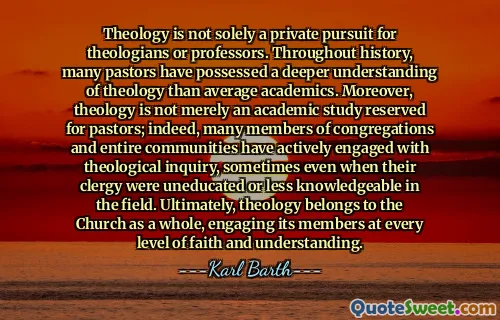Karl Barth was a Swiss Reformed theologian, pivotal in 20th-century Protestant thought. His most significant work is the "Church Dogmatics," which redefined systematic theology and emphasized the revelation of God through Jesus Christ. Barth argued against liberal theology, asserting that human understanding of God is limited and that divine revelation should guide faith and practice. Barth's theological approach focused on the sovereignty of God, the importance of scripture, and the necessity of grace. He believed that God's Word should not be reduced to human concepts but should remain a dynamic and transformative force in the believer's life. This perspective influenced both the church and modern theology, urging a return to a more Christ-centered interpretation of faith. Additionally, Barth engaged with contemporary issues through his theology, addressing social justice, politics, and ethics. His stance during World War II, particularly against the Nazi ideology, showcased his commitment to justice and the moral implications of faith. Through his teachings, Barth continues to inspire theological discourse and energize critical reflection on the nature of God and humanity's response to divine grace.
Karl Barth was a Swiss Reformed theologian, pivotal in 20th-century Protestant thought. His most significant work is the "Church Dogmatics," which redefined systematic theology and emphasized the revelation of God through Jesus Christ. Barth argued against liberal theology, asserting that human understanding of God is limited and that divine revelation should guide faith and practice.
Barth's theological approach focused on the sovereignty of God, the importance of scripture, and the necessity of grace. He believed that God's Word should not be reduced to human concepts but should remain a dynamic and transformative force in the believer's life. This perspective influenced both the church and modern theology, urging a return to a more Christ-centered interpretation of faith.
Additionally, Barth engaged with contemporary issues through his theology, addressing social justice, politics, and ethics. His stance during World War II, particularly against the Nazi ideology, showcased his commitment to justice and the moral implications of faith. Through his teachings, Barth continues to inspire theological discourse and energize critical reflection on the nature of God and humanity's response to divine grace.
More »
Today Birthdays
1955 -
Max Lucado
1946 -
John Piper
1842 -
William James
1907 -
Abraham Joshua Heschel
1887 -
Aldo Leopold
1755 -
Alexander Hamilton
1976 -
Alethea Kontis
1971 -
Mary J. Blige
1825 -
Bayard Taylor
1943 -
Jim Hightower
1885 -
Alice Paul
1923 -
Carroll Shelby
1928 -
David L. Wolper
1954 -
Kailash Satyarthi
1972 -
Amanda Peet
1946 -
Naomi Judd
1970 -
Malcolm D. Lee
1955 -
Christian Marclay
1973 -
Rahul Dravid
1987 -
Jamie Vardy
1942 -
Clarence Clemons
1992 -
Fatima Sana Shaikh
1948 -
Larry Harvey
1930 -
Rod Taylor

